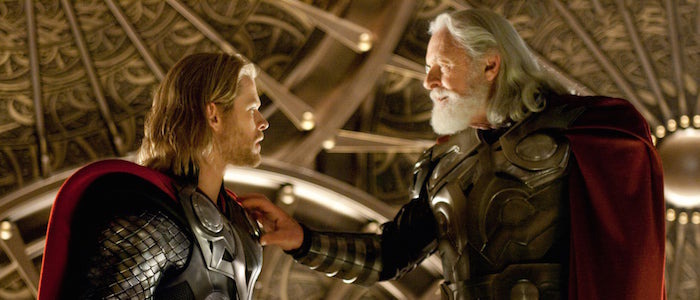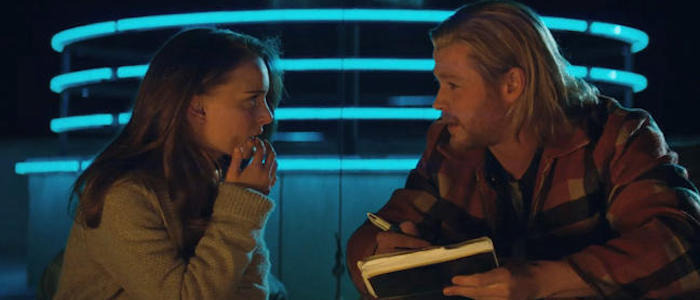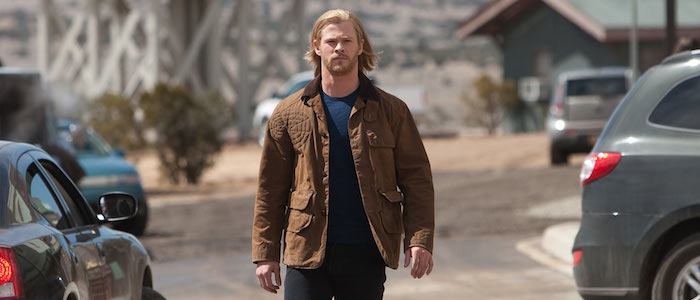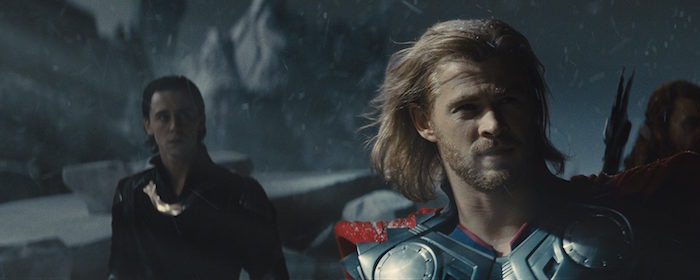'Thor' Was The Point Of No Return For Marvel Studios
(Welcome to Road to Infinity War, a new series where we revisit the first 18 movies of the Marvel Cinematic Universe and ask "How did we get here?" In this edition: how the blend of Shakespearian drama and goofy comedy in Thor sets a new tone for the MCU.)
After a trio of relatively grounded sci-fi action flicks, the Marvel Cinematic Universe took its first leap of faith. Thor was the first Marvel film to go into production after Disney purchased the company in 2009, but its departure from its predecessors didn't simply hinge on the brand name behind it. Where Iron Man and The Incredible Hulk helped established the politics of this world, Kenneth Branagh's Thor redefined the visual and tonal language of the Marvel Universe as a whole, not to mention the fact that Marvel somehow convinced Kenneth Branagh to leave his personal stamp on a superhero movie.
The result, while messy from a character standpoint, strikes an unprecedented balance. It straddles two distinct tones, a combination that would eventually coalesce in 2014's Guardians of the Galaxy, but lest we get ahead of ourselves, it's the meshing of these two seemingly disparate approaches that forms the crux of Marvel's first cosmic adventure, and what the film is at its core.
A Bridge Between Worlds
Kenneth Branagh's filmography prior to directing Thor includes the following: Twelfth Night, Henry V, Much Ado About Nothing, Hamlet, In The Bleak Midwinter (the story of a man fighting depression by putting on a production of Hamlet), Love's Labour's Lost, and As You Like It. That's as many Shakespeare adaptations as Orson Welles, Akira Kurosawa and Vishal Bhardwaj combined, if you count Branagh's role as Iago in Oliver Parker's Othello, and it arguably makes Branagh the bard's biggest fanboy. He's exactly the guy you call when you want to make a grandiose family drama involving an aged king, an ambitious prince and the snake in his ear, but what makes Thor such an oddity is that in addition to being "Shakespeare In Space," it's also a fish-out-of-water alien comedy bordering on slapstick.
The majority of the film's runtime takes place on Earth, where Thor, the banished God of Thunder, smashes a mug of hot cocoa, walks into a pet store demanding a horse, gets a tranquilizer in the butt, is tasered by Kat Dennings, and gets hit with a car on more than one occasion. Taika Waititi's Thor: Ragnarok may have pushed the Marvel cosmos to its farcical limit this past November, but the seeds for Thor-centric comedy have been in place for almost a decade. A drama about the complications of royal lineage ought not to mix with a film about a brutish space oaf in small-town New Mexico – in many ways they don't; they may as well be two different films – but it's in attempting to dramatize this divide that Marvel managed to set the stage for a crossover wherein a scorned space-prince leads an alien army into New York City in The Avengers.
Thor is a warmonger. He comes from a lineage of warmongers, and despite his father's shifting attitude towards violent conflict (another seed planted here before being taken to its logical conclusion in Ragnarok), the Asgardian prince seeks to do battle against the Frost Giants of Jotunheim at any given opportunity. In his banishment, much like Tony Stark's caveside retreat, he has a change of heart about how best to use his weaponry, though his newfound humility comes not through seeing the ill effects of war, but through seeing kindness. He is adrift in this new world, unworthy of his hammer and unable to regain his regal identity, but it's that very regality and all its implications that are called into question when he arrives on Earth.
Thor's ascension to the throne of Asgard is dependent on two things: being his father's son, and being a fearsome warrior. His conquests involve charging into battle and physically besting opponents with a phallic symbol (without which he's rendered powerless), and his most recent fight came about not through necessity, but through the desire to establish dominance over a culture already in tatters. In fact, he's about to do the sensible thing and retreat from Jotunheim when he's provoked by one of the Frost Giants. The taunt in question? Thor resents being referred to as a "princess." Having his masculinity questioned sets into motion the events of the entire film, wherein his stranger-in-a-strange-land tale isn't just about being around new culture and technology, but around Natalie Portman's Jane Foster, whom the film ends up siding with to a significant degree in terms of narrative perspective.
The Gender Politics of Thor Thor is Hot
Thor is a rugged, chiseled superhero, and the first Marvel hunk we see through a woman's eyes. This is the film that began the Marvel trend of finding excuses for its men to be shirtless (turning even Chris Pratt of Parks and Recreation into an Adonis), catering to the folks in the audience who enjoy the action genre but find it to be lacking in male eye-candy. Though more than just physically, Thor's lens caters to women in ways usually tailored to men. Jane Foster, for instance, is a bumbling, nerdy girl who gets the attractive guy, rather than her simply being a trophy for Thor's troubles. And while Jane certainly influences Thor's character arc, helping him change by showing him kindness, it's Jane who largely benefits from the specifics of their relationship. Not only is Thor's mere existence a validation of her lifelong work, but Thor himself sits her down to validate her efforts under the stars.
It's also during their interactions that the film begins to feel like a romantic comedy, with characters from different worlds – in this case, literally – and with different outlooks overcoming quirky odds and ending up together (well, almost). Strip away all the space stuff, and what you're left with is a pig-headed playboy who helps a girl get her diary back, and learns to cook eggs for other people instead of scarfing down a box of Poptarts all on his own.
And it really is the gender politics of this world that make it stand out from most male-driven superhero films. Thor comes from a place of antiquity despite its futuristic technology. Asgard is a patriarchal monarchy, wherein women are maidens of the court (like Thor's mother Frigga, played by Rene Russo), given that most of the say in the kingdom's affairs belong to its king. Either that, or they're the rare warrior like Lady Sif (Jamie Alexander), who fulfils a traditionally masculine role within the royal hierarchy. Thor himself may be relatively forward-thinking in this regard – from their brief interactions, he appears to have supported Sif proving her worth as a soldier – but it isn't until stepping foot on Earth that he meets a woman who is also a leader in her own field.
More importantly, the woman in question, Jane, has no physical powers. Rather, she studies the physical. Her job is to inspect and investigate advanced astrophysics, the very magic that Thor has, up until this point, taken for granted. In this case, her job is to learn about Thor himself. Her very role in society involves progress through understanding, rather than knocking things over with a hammer, and it's this understanding nature that draws Thor to her as he attempts to introspect and answer a fundamental question...
Who is Thor?
The film's Asgard-set drama is expressed with clarity. Thor's violent ambitions, exacerbated by his eldritch brother Loki (Tom Hiddleston), lead to his banishment. In the meanwhile, Hiddleston's stellar scenes with Anthony Hopkins' Odin provide a raw emotional backbone for the kingdom's melodrama. Loki is the son of two warring kings, adopted for the express purpose of bringing Asgard and Jotunheim together – he's the stuff of myth, and in any other story he'd be the hero – but despite Odin's genuine love for him, Loki has neither a throne nor a sense of belonging. Not when his older brother Thor was granted both by birthright, a regret that Odin seems unable to challenge given his unwillingness to step outside his kingdom's traditions. You could play any scene involving Loki or Odin and use it to teach a masterclass in classical drama, but Thor's Earth-bound story doesn't have quite the same narrative deftness.
"Who is Thor?" is the central dramatic question of the entire film, and it's a question asked promptly at every turn. Thor is a warmonger, but what else? He is a prince, but what more? Who is he when his powers are stripped away, and he no longer has war and the symbols of masculine antiquity to define him? The answers to these questions, however, find themselves drawing the short stick.
The conceit of the film's Earth-half revolves around Thor's inability to lift his hammer, a feat he can't perform until he's "worthy" by a standard he doesn't quite understand. Thor himself being unable to articulate the journey that lies ahead affords the character moments of self-reflection; as Thor and Erik Selvig (Stellan Skarsgård) drink together shortly after the depowered God is told of his father's death, there's a moment of quiet uncertainty where he can't quite figure out what to do next. It's a fantastic dramatic beat in the moment, but Thor's lack of discernible outlook at this point is inadvertently shared by the narrative as a whole. Thor is an arrogant imperialist who seeks to conquer by force, and the reason he's banished in the first place is his bloodthirst and reckless militarism, facets of his personality that are in line with Asgardian tradition. The reason he's finally able to lift his hammer however, is entirely disconnected from this setup.
Why Does Thor Get His Groove Back?
When confronted by Loki's Destroyer in New Mexico, Thor's friends engage the metallic creature in battle as the exiled prince shepherds innocent humans to safety. He tells Sif and The Warriors Three that he has a plan, though the expression on his face says it all: this plan will likely lead to his demise. And it does. Thor nobly sacrifices himself to save the humans in his vicinity, but this sort of gesture was never called into question during the preceding narrative. Laying down his life for someone else, especially someone innocent, never comes up during the preceding hour and a half, and even Thor's apology to his brother in this moment is for a reason he doesn't seem to know – it's an apology just in case.
There's little to suggest whether this sacrifice is something the Thor of a few days prior would or would not have performed, except for Sif mentioning that she wants to die "a warrior's death," indicating that self-sacrifice on the battlefield is already a symbol of nobility in Asgardian tradition. So what is his Earth-bound journey really for? Would Thor not have ferried the innoceny bystanders to safety regardless of the kindness shown to him by Jane Foster? These are questions that don't seem to have answers because they only ever come up as answers, to questions that were never asked. When he returns to Asgard, he says "I've changed" when Loki questions why he no longer wants to kill the Frost Giants, a race of creatures he once feared and saw as detestable because of their centuries old blood-feud. What reason would Thor have to change his mind about them, when all he's done differently is save an entirely different race of beings that he never had any conflict with or any reason to despise?
Thor does, however, complete some semblance of an arc upon his return. As Loki unleashes the full power of the Bifrost, the bridge between worlds, he aims its destructive capabilities at Jotunheim. The bridge is sure to destroy the world of the Frost Giants and everyone in it, but Thor hammers away at its foundations until it breaks, cutting him off from Earth and from Jane in the process. This is, unboundedly, an act of selflessness, wherein he chooses the greater good over his personal desires, and an act he would have never performed pre-banishment given that it saves a realm at war with Asgard – but what led him to this point is still a question unanswered. His actions, while in service of saving lives (both human and Frost Giant), don't stem from reciprocating or paying forward any of the kindness or selflessness he was shown on Earth. In fact, destroying the Bifrost still comes about through the force of his hammer, a symbol of masculine destructiveness, as if he's merely shifting between methodologies within the same outlook and archaic militaristic paradigm.
Intellectualizing Thor's arc, the difference between where he begins his journey and where he ends it, isn't difficult. It's part of what allows the film to remain functional, even if it feels emotionally incomplete owing to that arc never following a sound trajectory. There is no singular moment that defines Thor as a character, no difficult decision that's satisfyingly expressed. His eventual selflessness is treated as the opposite of his arrogance, but it's presented first as disconnected from his violent conquests (when he sacrifices himself to The Destroyer to save the humans, an act entirely independent of his warmongering). And thus the second, and arguably more important given its place in the plot, is rendered an emotional and logistical leap (deciding to show mercy to the Frost Giants without ever confronting why he or Asgard were at war with them in the first place). Given that the first instance of supposedly newfound mercy is what ought to have led him to the second, Thor's story ends up being a shaky structure built upon an already shaky foundation.
As with Iron Man, there was a hesitance to ever touch on what lay beneath the texture of war, even if it would have led to a more whole understanding of the character and a more emotionally satisfying story. But as with the various sequels, both Iron Man's and the Avengers', the door was still left open for course-correction in the long term – the shaky foundation comes crumbling down in Thor: Ragnarok – an opportunity few franchises were ever afforded until the MCU experiment paved the way. And this experiment wouldn't have taken the shape it now has, with worlds colliding and questions of militarism and responsibility being asked and answered more clearly, had Kenneth Branagh not ventured into the cosmos and expanded on the fabric of the Marvel Universe.




